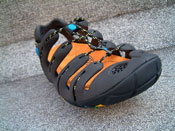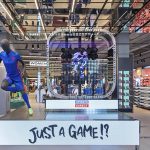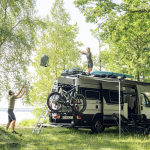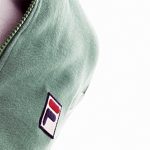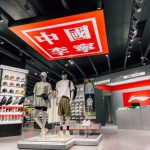Outdoor specialty retailers are constantly looking for new products to bring in store traffic. Nothing lifts sales receipts like a new product getting publicity in outdoor-oriented consumer magazines. Now, the time might be right to expand the traditional definition of your customer.
Introducing Sunny, Daisy, Lassi, Boulder, and Yawkey. Think dogs; sixty-eight million thirsty dogs. According to the American Pet Products Manufacturers Association, almost 30 million adults have taken their dog on a trip of 50 miles or more. We use backpacks, hydration bladders, and canoes to carry our gear organized and keep us comfortable. More and more, dog owners are paying the same kind attention to their four-legged travel companions.
Companies like Ollydog and Ruffwear have created full lines of products specifically designed for the dog that considers the outdoors more than just a place to “do their duty.”
Patrick Kruse founded Ruffwear after a mountain biking trip in the Los Padres National Forest inspired him to create a collapsible food and water bowl for a friends dog.
Kruse introduced his bowl at an Outdoor Retailer Show. David Madden, Ruffwears marketing communications manager described the reaction to the launch, “LL Bean bought about 8,000 pieces and Ruffwear was born. He took a look at what people were doing and his goal was to enhance the interaction between dogs and humans by allowing people to take their dogs with them on their adventures. We bring gear for ourselves, but take the dogs for granted.”
The four members of Ollydogs ownership group came from Sierra Designs. Mike Moores explained, “When Sierra Designs relocated to Colorado, we stayed in California. There was party that was taking hold and gaining momentum. All four of us owned dogs and had problems with the gear that we felt could be solved. We attacked it from that point of view.”
Product Lines
The product lines for both companies extend far beyond the leashes and collars offered by companies selling to pet-specific retailers. Retailers can offer their customers travel bowls, flotation coats, packs, toys, and even portable doghouses. Although their lines are smaller, companies like Mountainsmith and Granite Gear offer packs filled with the same attention to technical features as their products for two-legged owners. Geoff OKeefe, president of Mountainsmith knows the market potential. “We have marketed dog packs for many years. Its not a big category for us, but we have a strong following for our dog packs.”
New product introductions and technical improvements keep the market competitive. “Everything we make we have made for a reason, something brand new to the market or something we have improved on. Were looking for a style or performance benefit,” Moores said. To help with that stinkiest of tasks, Ollydogs Sling Bag features a poop bag dispenser built into the shoulder strap. Ruffwears K-9 Float Coat and Overcoat II protect dogs from harsh weather.
Reaction from Specialty Retailers
At outdoor specialty retailers, theres still a lot of room for growing the canine products market. Madden commented, “There are always early adopters who own dogs and see the potential. In the beginning there was a process of explaining it to the buyer and getting them to think about having a dog section.”
Armed with statistical information about the size of the pet market and anecdotal stories about success at retailers who have committed space to the category, more and more retailers are looking at adding dog gear. “There is no convincing anymore. They come in ready to buy the category,” Madden said.
Ollydog shares a similar experience. “At the Outdoor Retailer Show, we sell virtually all of our samples. That tells me the consumer reaction is excellent in the outdoor industry,” Moores said.
Outside the store, retailers may be dog lovers, but pricing, support, and product selection are critical elements to consider before bringing in a new category. Limited display space is an example of one obstacle to overcome. Moores explained, “Do I want to devote space to something like this? Its not just a new line, its a new world.” OKeefe added, “More and more retailers are building up their pet product categories and giving them its own merchandising geography in the store.”
Building a brand consumers will recognize simplifies the selling process. “We made sure we came in with a strong brand and full line. The sophistication of the outdoor industry expects it. In the pet industry, it positioned us as a player immediately,” explained Moores.
Ruffwear offers video training tools and a point of purchase program to retailers. “If you merchandise a section of dog products, customers will immediately think of the four-legged friend they have at home,” Madden said.
Dog Design
Dogs come in as many different shapes and sizes as their owners. An eighty-pound mutt can be a thick-chested husky or tall and lean golden retriever.
Designers of dog packs, float coats, and collars dont have the kind of standardized anatomical statistical information that helps all apparel manufacturers define a womens small or mens extra large.
Madden described Ruffwears approach, “Thats where our experience comes into play. Weve been doing this for at least 10 years. We were one of the first to actually use sizing charts that didnt revolve around weight. We use girth, length, and width measurements. We developed a sizing system that incorporates six different size ranges from XXS to XXL. We fit a wide variety of dogs now.”
Ollydog uses American Kennel breed standards as a starting point and tailors the gear to appropriate segments. “In the pet category, tiny dogs are big business, in the outdoor segment the dogs are usually larger,” Moore explained.
Designing for size isnt the only challenge. For some dog owners, fashion considerations like color and style influence the purchase decision. Fashion aside, the gear has to be durable enough to serve its function. “There is a lot of pet fashion out there that isnt strong enough to hold the dog,” Moore added.
Fashion considerations play a role at Ruffwear as well. “Weve always valued the functionality of the product first. Weve got that down, the products fit well and perform well. As we mature as a company, were taking more of a fashion-oriented approach,” Madden said.
Retailers who have not sold dog products before may underestimate the owners connection with their canine friends. “Dogs have moved from the yard, to the porch, to the living room, to the bedroom. The way people are buying for their dogs is becoming similar to how they are buying for themselves,” Moores explained.
These owners arent afraid to tell manufacturers what they think. Madden often hears comments that indicate dog owners think about their pets with the same amount of love and concern as they do for their children. Ruffwear reviews input received from telephone calls and email messages from retailers and customers to look for issues and areas for improvement.
Calls from frustrated owners are mixed in with the rave reviews. “Most issues about fit come from the human side. The problem isnt with the dog or the products, its usually with an owner being too quick to judge whether it will work,” offered Madden.
“Dogs might need time to get used to wearing booties or a pack, but with a little time, its not a problem. Dogs are used to running free, maybe with a collar on. Putting a pack on might be strange at first, but dogs are very adaptable. When was the last time you heard a dog complain? Dogs have a sense of purpose carrying their own food, water, and toys,” Madden said.
The pet business is growing dramatically. Outdoor specialty retailers have an opportunity to capture additional profits by adding a new product category instead of expanding an already crowded section of the store. “Its easy to merchandise. People spend money on their dogs and we love them,” Moores said.
Editors Note: Cat lovers are people too, but this segment has not grown due to difficulties with the target audience. Moores explained, “We love cats, but they arent very good at catching Frisbees.”

